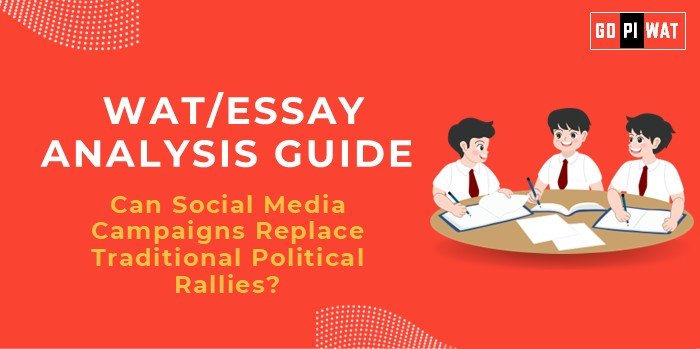📋 Written Ability Test (WAT)/Essay Analysis Guide: Can Social Media Campaigns Replace Traditional Political Rallies?
🌐 Understanding the Topic’s Importance
This topic is crucial as it bridges technology and governance, illustrating how digital platforms transform traditional societal systems, including political processes.
📝 Effective Planning and Writing
- ⏳ Time Allocation:
- 📌 Planning: 5 minutes
- ✍️ Writing: 20 minutes
- 🔍 Review: 5 minutes
- 💡 Preparation Tips:
- 📊 Gather key statistics on digital engagement and campaign spending.
- 🔎 Note relevant stakeholders and challenges.
💡 Introduction Techniques for Essays
- ⚖️ Contrast-Based: “In a world where one viral post can reach millions in seconds, traditional rallies that attract thousands seem increasingly outdated. Yet, do digital campaigns truly capture the essence of voter engagement?”
- ⏳ Timeline-Based: “From mass rallies during India’s independence movement to viral hashtags defining elections today, political campaigning has come a long way.”
🛠️ Structuring the Essay Body
- 🏆 Achievements:
- ✅ “Social media enables cost-effective, targeted campaigns, with platforms like Facebook and Twitter being pivotal during elections.”
- 📚 Example: A 2019 Indian Lok Sabha candidate used WhatsApp to reach 3 million voters directly.
- ⚠️ Challenges with Comparative Analysis:
- ❌ “Fake news dissemination undermines democracy, as seen in Myanmar’s Rohingya crisis involving Facebook.”
- 📉 “Rural India’s low internet penetration—only 30%—restricts the efficacy of digital campaigns.”
- 🚀 Future Outlook: Integration of hybrid models combining the authenticity of rallies with the efficiency of digital outreach.
📄 Concluding Effectively
- ⚖️ Balanced Perspective: “While social media campaigns revolutionize political outreach, traditional rallies remain vital for personal connection, ensuring a hybrid approach leads to inclusive and effective democracy.”
- 🌍 Global Comparison: “Countries like Estonia exemplify seamless digital integration, but even they acknowledge the irreplaceable role of human interaction in politics.”
🔎 Analyzing Successes and Shortcomings
- 💪 Key Achievements: Wide reach, cost efficiency, and direct voter interaction.
- ⚠️ Ongoing Challenges: Digital divide, misinformation, and regulatory hurdles.
- 🌍 Global Context: Estonia’s e-governance vs. India’s rural connectivity gaps.
💡 Recommendations for Sustainable Progress
- 🤝 Combine digital campaigns with targeted in-person engagements.
- 🛡️ Strengthen regulations against misinformation and data misuse.
- 🌐 Enhance rural digital literacy and infrastructure.
✍️ Sample Short Essays
- ⚖️ Balanced Perspective: “The digital age ushers in unprecedented opportunities for political campaigns. Social media fosters direct voter engagement, yet the emotive impact of traditional rallies remains irreplaceable.”
- 🌟 Solution-Oriented: “A hybrid model, blending the efficiency of digital platforms with the outreach of rallies, ensures equitable political participation.”
- 🌍 Global Comparison: “While social media bolsters political campaigns globally, countries must address the associated challenges to harness its full potential responsibly.”


